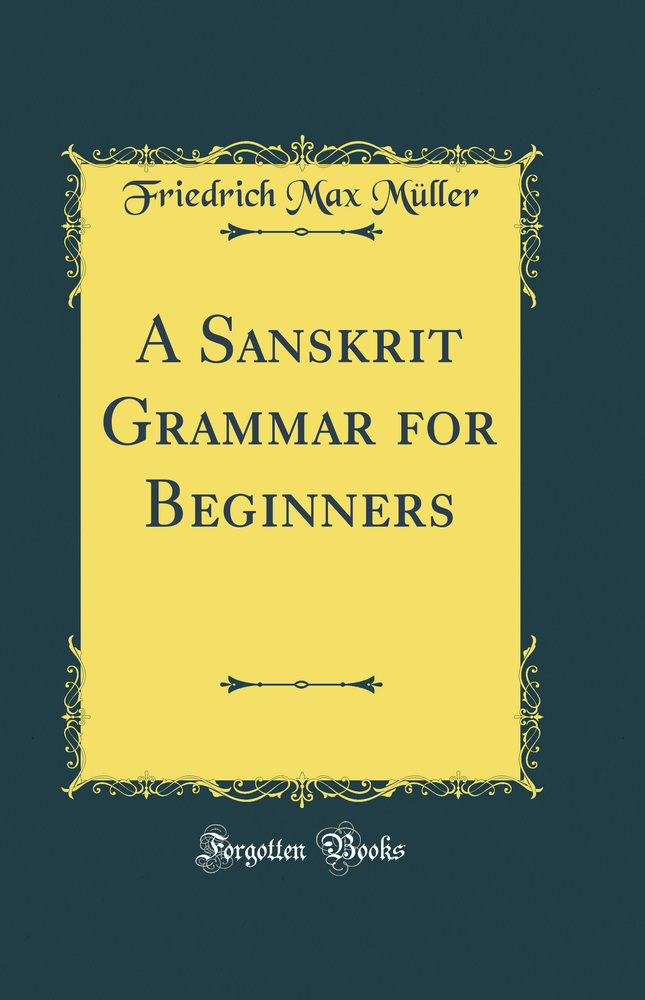Description
Excerpt from A Sanskrit Grammar for Beginners
The experience of some years'' teaching has convinced me that Sanskrit, compared with other dead languages, is not difficult to learn. The fact that the ordinary Sanskrit verb has no subjunctive, only one imperative, one infinitive, and two optatives, altogether only thirteen moods and tenses in each voice, while Greek has upwards of thirty, would alone go far to prove the comparative simplicity of Sanskrit Acci dence. Again, the absence in Sanskrit of the indirect construction, which constitutes a conspicuous difficulty of Syntax in the classical languages, is in itself a tolerably clear proof that the structure of complex sentences in Sanskrit must be far less involved than in Latin or Greek. On the other hand, though it must be admitted that the phonetic laws of Sanskrit present greater difficulties than in other languages, most of these difficulties will disappear when it is pointed out that the rules of Sandhi rest on two leading principles, the avoidance of hiatus in the case of vowels and assimilation in the case of consonants.
I feel sure that the exaggerated idea of the difficulties of Sanskrit commonly entertained is due to the fact that the amount of matter contained in the Sanskrit grammars hitherto published in England and America is far too exhaustive for elementary purposes. Beginners are not aware that a large proportion of the matter presented to them, though necessary for a minute and critical knowledge or high proficiency in composition, may be altogether dispensed with by those whose chief object is to be able to read with ease the best works of classical Sanskrit literature.
About the Publisher
Forgotten Books publishes hundreds of thousands of rare and classic books. Find more at www.forgottenbooks.com
This book is a reproduction of an important historical work. Forgotten Books uses state-of-the-art technology to digitally reconstruct the work, preserving the original format whilst repairing imperfections present in the aged copy. In rare cases, an imperfection in the original, such as a blemish or missing page, may be replicated in our edition. We do, however, repair the vast majority of imperfections successfully; any imperfections that remain are intentionally left to preserve the state of such historical works.
The experience of some years'' teaching has convinced me that Sanskrit, compared with other dead languages, is not difficult to learn. The fact that the ordinary Sanskrit verb has no subjunctive, only one imperative, one infinitive, and two optatives, altogether only thirteen moods and tenses in each voice, while Greek has upwards of thirty, would alone go far to prove the comparative simplicity of Sanskrit Acci dence. Again, the absence in Sanskrit of the indirect construction, which constitutes a conspicuous difficulty of Syntax in the classical languages, is in itself a tolerably clear proof that the structure of complex sentences in Sanskrit must be far less involved than in Latin or Greek. On the other hand, though it must be admitted that the phonetic laws of Sanskrit present greater difficulties than in other languages, most of these difficulties will disappear when it is pointed out that the rules of Sandhi rest on two leading principles, the avoidance of hiatus in the case of vowels and assimilation in the case of consonants.
I feel sure that the exaggerated idea of the difficulties of Sanskrit commonly entertained is due to the fact that the amount of matter contained in the Sanskrit grammars hitherto published in England and America is far too exhaustive for elementary purposes. Beginners are not aware that a large proportion of the matter presented to them, though necessary for a minute and critical knowledge or high proficiency in composition, may be altogether dispensed with by those whose chief object is to be able to read with ease the best works of classical Sanskrit literature.
About the Publisher
Forgotten Books publishes hundreds of thousands of rare and classic books. Find more at www.forgottenbooks.com
This book is a reproduction of an important historical work. Forgotten Books uses state-of-the-art technology to digitally reconstruct the work, preserving the original format whilst repairing imperfections present in the aged copy. In rare cases, an imperfection in the original, such as a blemish or missing page, may be replicated in our edition. We do, however, repair the vast majority of imperfections successfully; any imperfections that remain are intentionally left to preserve the state of such historical works.
Details
Publisher - Forgotten Books
Language - English
Hardback
Contributors
Author
Friedrich Max Müller
Published Date -
ISBN - 9780265811979
Dimensions - 22.9 x 15.2 x 1.1 cm
Page Count - 208
Paperback
Contributors
Author
Friedrich Max Müller
Published Date -
ISBN - 9781333308278
Dimensions - 22.9 x 15.2 x 1.1 cm
Page Count - 210
Payment & Security
Your payment information is processed securely. We do not store credit card details nor have access to your credit card information.

